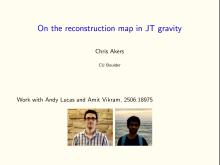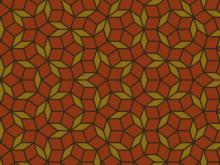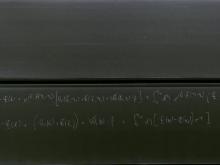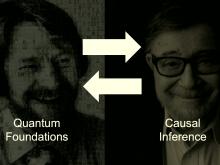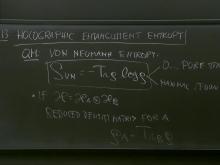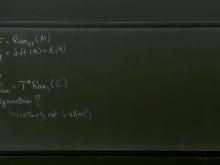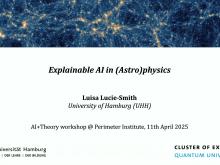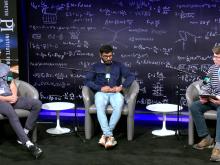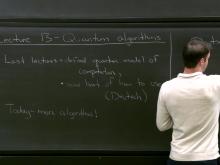Format results
-
63 talks-Collection NumberC25025
Talk
-

-

-

-

Baryon feedback: How extreme is too extreme?
Alexandra Amon Princeton University
-

Cosmological feedback from a halo assembly perspective
Hiranya Peiris University of Cambridge
-

-

-

-
-
QIQG 2025
29 talks-Collection NumberC25024Talk
-

Opening Remarks
-
Marcela Carena Perimeter Institute for Theoretical Physics
-
Emily Petroff Perimeter Institute for Theoretical Physics
-
Chris Waddell Perimeter Institute for Theoretical Physics
-
-

-

Chaos and the Emergence of the Cosmological Horizon
David Kolchmeyer Massachusetts Institute of Technology
-

Operator Algebras and Third Quantization
Nima Lashkari Purdue University West Lafayette
-

Swing Surfaces in AdS/CFT
Sabrina Pasterski Perimeter Institute for Theoretical Physics
-

An Emergent Area Operator in 2d CFT
Ronak Soni Chennai Mathematical Institute
-

Gravity As An Oracle (Vision Talk)
Raphael Bousso University of California, Berkeley
-

Vacuogenesis (Vision Talk)
Ted Jacobson University of Maryland, College Park
-
-
Energy Operators in Particle Physics, QFT, and Gravity - June 6-13, 2025
4 talks-Collection NumberC25035Talk
-
Lee's Fest: Quantum Gravity and the Nature of Time
43 talks-Collection NumberC25023Talk
-

Opening Remarks
-
Marcela Carena Perimeter Institute for Theoretical Physics
- Laurent Freidel
PIRSA:25060029 -
-

-

-

-

-

-

Gravitational collapse, shock waves and white holes
Viqar Husain University of New Brunswick
PIRSA:25060035 -

Building and (hints of) seeing gravitational statistical mechanics
Seth Major Hamilton College
PIRSA:25060036
-
-
Cosmology (Elective), PHYS 621, March 31 - May 2, 2025
13 talks-Collection NumberC25012Talk
-

Lecture - Cosmology, PHYS 621
Neal Dalal Perimeter Institute for Theoretical Physics
-

Lecture - Cosmology, PHYS 621
Neal Dalal Perimeter Institute for Theoretical Physics
-

Lecture - Cosmology, PHYS 621
Neal Dalal Perimeter Institute for Theoretical Physics
-

Lecture - Cosmology, PHYS 621
Neal Dalal Perimeter Institute for Theoretical Physics
-

Lecture - Cosmology, PHYS 621
Neal Dalal Perimeter Institute for Theoretical Physics
-

Lecture - Cosmology, PHYS 621
Neal Dalal Perimeter Institute for Theoretical Physics
-

Lecture - Cosmology, PHYS 621
Neal Dalal Perimeter Institute for Theoretical Physics
-

Lecture - Cosmology, PHYS 621
Neal Dalal Perimeter Institute for Theoretical Physics
-
-
Causal Inference (Elective), PHYS 777, March 31 - May 2, 2025
13 talks-Collection NumberC25015Talk
-

Lecture - Causal Inference, PHYS 777
Robert Spekkens Perimeter Institute for Theoretical Physics
-

Lecture - Causal Inference, PHYS 777
Robert Spekkens Perimeter Institute for Theoretical Physics
-

Lecture - Causal Inference, PHYS 777
Robert Spekkens Perimeter Institute for Theoretical Physics
-

Lecture - Causal Inference, PHYS 777
Robert Spekkens Perimeter Institute for Theoretical Physics
-

Lecture - Causal Inference, PHYS 777
Robert Spekkens Perimeter Institute for Theoretical Physics
-

Lecture - Causal Inference, PHYS 777
Robert Spekkens Perimeter Institute for Theoretical Physics
-

Lecture - Causal Inference, PHYS 777
Robert Spekkens Perimeter Institute for Theoretical Physics
-

Lecture - Causal Inference, PHYS 777
Robert Spekkens Perimeter Institute for Theoretical Physics
-
-
AdS/CFT (Elective), PHYS 777, March 31 - May 2, 2025
13 talks-Collection NumberC25013Talk
-

Lecture - AdS/CFT, PHYS 777
David Kubiznak Charles University
-

Lecture - AdS/CFT, PHYS 777
David Kubiznak Charles University
-

Lecture - AdS/CFT, PHYS 777
David Kubiznak Charles University
-

Lecture - AdS/CFT, PHYS 777
David Kubiznak Charles University
-

Lecture - AdS/CFT, PHYS 777
David Kubiznak Charles University
-

Lecture - AdS/CFT, PHYS 777
David Kubiznak Charles University
-

Lecture - AdS/CFT, PHYS 777
David Kubiznak Charles University
-

Lecture - AdS/CFT, PHYS 777
David Kubiznak Charles University
-
-
Quantum Matter (Elective), PHYS 777, March 31 - May 2, 2025
15 talks-Collection NumberC25011Talk
-

Lecture - Quantum Matter, PHYS 777
Chong Wang Perimeter Institute for Theoretical Physics
-

Lecture - Quantum Matter, PHYS 777
Chong Wang Perimeter Institute for Theoretical Physics
-

Lecture - Quantum Matter, PHYS 777
Chong Wang Perimeter Institute for Theoretical Physics
-

Lecture - Quantum Matter, PHYS 777
Chong Wang Perimeter Institute for Theoretical Physics
-

Lecture - Quantum Matter, PHYS 777
Chong Wang Perimeter Institute for Theoretical Physics
-

Lecture - Quantum Matter, PHYS 777
Chong Wang Perimeter Institute for Theoretical Physics
-

Lecture - Quantum Matter, PHYS 777
Chong Wang Perimeter Institute for Theoretical Physics
-

Lecture - Quantum Matter, PHYS 777
Chong Wang Perimeter Institute for Theoretical Physics
-
-
Quantum Gravity (Elective), PHYS 644, February 24 - March 28, 2025
13 talks-Collection NumberC25014Talk
-

Lecture - Quantum Gravity, PHYS 644
Aldo Riello Perimeter Institute for Theoretical Physics
-

Lecture - Quantum Gravity, PHYS 644
Aldo Riello Perimeter Institute for Theoretical Physics
-

Lecture - Quantum Gravity, PHYS 644
Aldo Riello Perimeter Institute for Theoretical Physics
-

Lecture - Quantum Gravity, PHYS 644
Aldo Riello Perimeter Institute for Theoretical Physics
-

Lecture - Quantum Gravity, PHYS 644
Aldo Riello Perimeter Institute for Theoretical Physics
-

Lecture - Quantum Gravity, PHYS 644
Aldo Riello Perimeter Institute for Theoretical Physics
-

Lecture - Quantum Gravity, PHYS 644
Aldo Riello Perimeter Institute for Theoretical Physics
-

Lecture - Quantum Gravity, PHYS 644
Aldo Riello Perimeter Institute for Theoretical Physics
-
-
Theory + AI Workshop: Theoretical Physics for AI
11 talks-Collection NumberC25022Talk
-

-

Causal Inference Meets Quantum Physics
Robert Spekkens Perimeter Institute for Theoretical Physics
PIRSA:25040086 -

Creativity by Compositionality in Generative Diffusion Models
Alessandro Favero École Polytechnique Fédérale de Lausanne
PIRSA:25040088 -

Towards a “Theoretical Minimum” for Physicists in AI
Yonatan Kahn Princeton University
PIRSA:25040089 -

Solvable models of scaling and emergence in deep learning
Cengiz Pehlevan Harvard University
PIRSA:25040091 -

Architectural bias in a transport-based generative model : an asymptotic perspective
Hugo Cui Harvard University
PIRSA:25040092 -

Statistical physics of learning with two-layer neural networks
Bruno Loureiro École Normale Supérieure - PSL
PIRSA:25040093 -

Renormalization Group Flows: from Optimal Transport to Diffusion Models
Jordan Cotler Harvard University
PIRSA:25040095
-
-
Theory + AI Symposium
21 talks-Collection NumberC25020Talk
-

Panel Discussion
-
Shirley Ho Flatiron Institute
-
Vicky Kalogera Northwestern University
-
Roger Melko University of Waterloo
-
Jesse Thaler Massachusetts Institute of Technology (MIT)
-
Marcela Carena Perimeter Institute for Theoretical Physics
PIRSA:25040079 -
-

-

Opening Remarks
PIRSA:25040109 -

EAIRA: Establishing a methodology to evaluate LLMs as research assistants.
Frank Cappello Argonne National Laboratory
PIRSA:25040059 -

State of AI Reasoning for Theoretical Physics - Insights from the TPBench Project
Moritz Munchmeyer University of Wisconsin–Madison
PIRSA:25040061 -

UniverseTBD: Democratising Science with AI & Why Stories Matter
Ioana Ciuca Stanford University
PIRSA:25040062 -

-

-
-
Quantum Information (Elective), PHYS 635, February 24 - March 28, 2025
13 talks-Collection NumberC25006Talk
-

-

Lecture - Quantum Information, PHYS 635
Alex May Perimeter Institute for Theoretical Physics
-

Lecture - Quantum Information, PHYS 635
Alex May Perimeter Institute for Theoretical Physics
-

Lecture - Quantum Information, PHYS 635
Alex May Perimeter Institute for Theoretical Physics
-

Lecture - Quantum Information, PHYS 635
Alex May Perimeter Institute for Theoretical Physics
-

Lecture - Quantum Information, PHYS 635
Alex May Perimeter Institute for Theoretical Physics
-

Lecture - Quantum Information, PHYS 635
Alex May Perimeter Institute for Theoretical Physics
-

Lecture - Quantum Information, PHYS 635
Alex May Perimeter Institute for Theoretical Physics
-
-
Cosmic Ecosystems
63 talks-Collection NumberC25025
In the past three decades, one of the most transformative insights in cosmology has been the realisation that the formation and evolution processes of cosmic structures such as supermassive black-holes, galaxies and clusters are deeply interconnected with the vast cosmic web that underpins the Universe. These processes do not happen in isolation, but are part of a dynamic ecosystem where matter and energy flow across scales, driving the growth and transformation of cosmic environments. Understanding this complex system, in particular the circum-galactic medium (CGM), is not only key to deciphering how matter is cycled and redistributed through accretion via filaments and outflows from AGN and supernovae, but also crucial for unlocking the next generation of discoveries in areas such as dark matter, the behaviour of the cosmic web, the forces that shape cosmic evolution, and more. This conference seeks to bring together cosmologists and astrophysicists to foster collaborative exploration of these interconnected cosmic ecosystems. By focusing on how structures interact with their environments across cosmic scales, this conference aims to catalyse groundbreaking discoveries in both astronomy and physics, providing fresh insights into the forces that govern the Universe. Special attention will be given to the joint analysis of large-scale structure and weak gravitational lensing data from surveys such as DESI, Euclid, LSST and Roman with CMB data from the Simons Observatory and CMB-S4, as well as how these can be integrated with observations of JWST, and existing and upcoming observations of X-ray emission, UV/X-ray absorption toward quasars, 21-cm emission, and FRBs. The goal is to explore the complementarity of these data sets and how their alignment can provide new insights into the interconnected processes shaping cosmic environments, particularly through joint modelling and simulations of many phases of gas and feedback across different regimes. Attention will also be given to bridging the gap between how cosmologists and astronomers approach the CGM, either top-down large-scale and hot and virial phase, vs bottom-up, cooler phases, at smaller scales. Topics will include: · Cosmic mass budget, including a census of where the baryons are. · Effect of baryons on dark matter structures on small and large scales. · Cosmic evolution of large-scale structures. · Bridging the gap between different probes.
Please see the Conference Themes for a more complete list of example topics.
The time has never been more right to unify these fields, as advances in observation, theory and simulations are poised to open new paths to revealing the cosmos’ most profound mysteries.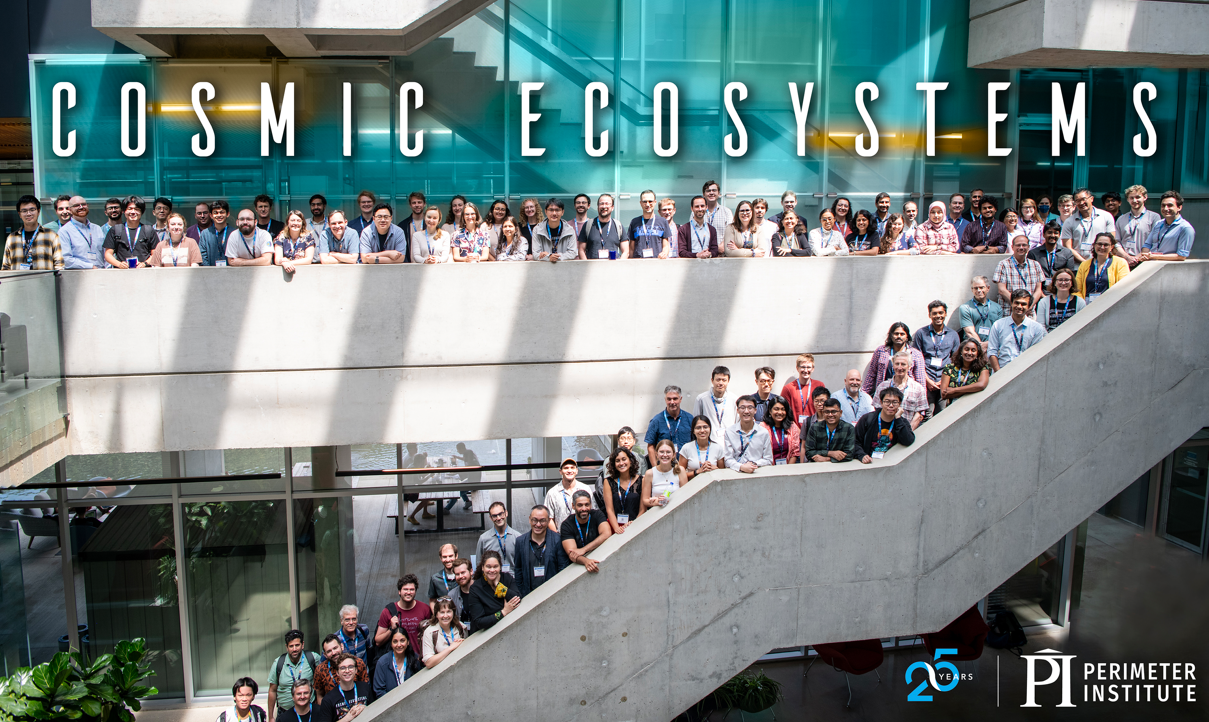
:: :: ::
Organizing Committee (LOC)
Selim Hotinli (Perimeter Institute)
Neal Dalal (Perimeter Institute)
Mike Hudson (University of Waterloo, Waterloo Centre for Astrophysics)
Matt Johnson (Perimeter Institute)
Katie Mack (Perimeter Institute)
Brian McNamara (University of Waterloo, Waterloo Centre for Astrophysics)
Arielle Phillips (University of Notre Dame / Simons Emmy Noether Fellow at Perimeter Institute)
Kendrick Smith (Perimeter Institute)
Scientific Organizing Committee (SOC)
Nick Battaglia (Cornell)
Hsiao-Wen Chen (University of Chicago)
Megan Donahue (Michigan State University)
Claude-André Faucher-Giguère (Northwestern)
Cameron Hummels (Caltech)
Selim Hotinli (Perimeter Institute)
Ian McCarthy (Liverpool John Moores University)
Daisuke Nagai (Yale)
Gwen Rudie (Carnegie Institution for Science)
Freeke van de Voort (Cardiff University)
Jessica Werk (University of Washington)
Confirmed Speakers
Alexandra Amon (Princeton)
Iryna Butsky (Stanford)
William Coulton (Cambridge University)
Sanskrti Das (Stanford)
Simone Ferraro (Berkeley Lab)
Nicholas J Frontiere (Argonne)
Vera Gluscevic (USC)*
Timothy Heckman (JHU)*
Boryana Hadzhiyska (UC Berkeley & Berkeley Lab)*
Stella Koch Ocker (California Institute of Technology)
Khee-Gan Lee (IPMU)*
Nir Mandelker (Hebrew University Jerusalem)
Chris Martin (Caltech)
Daisuke Nagai (Yale)
Andrew Newman (Carnegie Institution for Science)
Peng Oh (UC Santa Barbara)
Hiranya Peiris (University of Cambridge)
Andrew Pontzen (Durham University)
Emanuel Schaan (SLAC)
Joop Schaye (Leiden University)*
Chuck Steidel (California Institute of Technology)
Jonathan Stern (Tel Aviv University)
Mark Voit (Michigan State University)
Irina Zhuravleva (University of Chicago)
*Virtual presenters
-
QIQG 2025
29 talks-Collection NumberC25024
QIQG 2025: Quantum Information in Quantum Gravity
QIQG 2025: Quantum Information In Quantum Gravity will unite researchers working at the intersection of quantum information theory and quantum gravity, to exchange insights and showcase recent developments bridging these fields. As part of the celebrations of Perimeter’s 25th anniversary, we will also feature vision talks by world-leading experts exploring pivotal and emerging themes at the nexus of quantum information and quantum gravity. Our program will span topics such as:- Algebraic approaches to field theory and gravity
- Observers, quantum reference frames, and relational observables
- Quantum focussing and the Generalized Second Law
- SYK and its double-scaled limit
- The quantum information theoretic structure of spacetime
- Edge modes and entanglement entropy across subregions
- The role of complexity in field theory and gravity
- The black-hole information puzzle and related issues
- Quantum error-correcting codes in quantum field theory and quantum gravity
- Quantum cryptography and its implications for gravity
- Gravitational wormholes and their information-theoretic implications
- Chaos and thermalization in many-body systems and their realization in quantum gravity
- Holographic cosmology and de Sitter space
:: :: ::
Scientific Organizers
Luca Ciambelli (Perimeter Institute)
Rob Myers (Perimeter Institute)
Chris Waddell (Perimeter Institute)
Beni Yoshida (Perimeter Institute)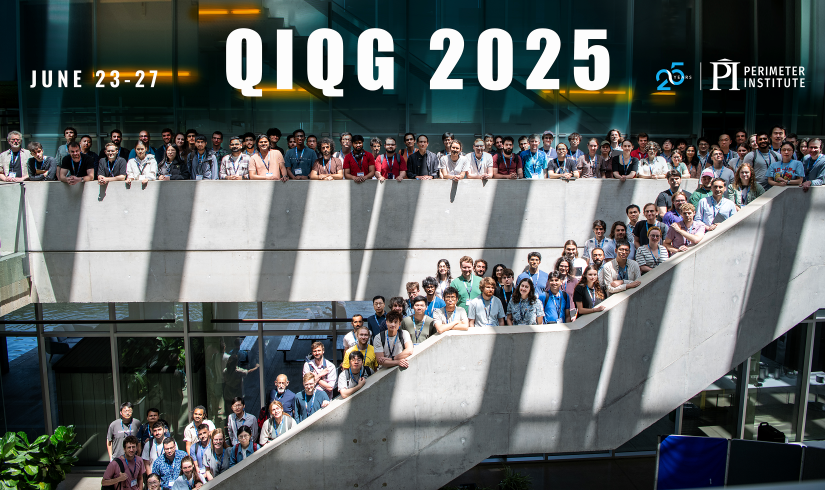
-
Energy Operators in Particle Physics, QFT, and Gravity - June 6-13, 2025
4 talks-Collection NumberC25035Detector operators, of which the average null energy operator provides the most famous example, arise as direct theoretical models of asymptotic measurements in collider experiments. In QFT, detector operators are expressed in terms of "light-ray operators", whose correlation functions provide an interesting class of non-perturbatively well-defined observables. There has recently been renewed interest in detector operators coming from three distinct directions: In CFTs, there has been progress understanding the space of light-ray operators, their organization into Regge trajectories, and their appearance in Lorentzian operator product expansions. In perturbative QFT and gravity, borrowing techniques from the study of scattering amplitudes, there has been progress understanding multi-point correlation functions of detector operators, in particular, their function space and singularities. Finally, in particle physics, there have recently been direct measurements of correlation functions of detector operators in collider experiments, enabling measurements of their scaling behavior and the structure of multi-point correlators of light-ray operators in QCD. In this mini-course I will give an introduction to the theory of light-ray/ detector operators, their correlators, and their applications in particle phenomenology, and provide an overview of the recent progress in the directions mentioned above. Throughout, I will attempt to highlight the different perspectives and motivations for studying these operators, coming from the CFT, amplitudes and phenomenological communities. I will conclude with a discussion of open problems in both theory and phenomenological applications, as well as highlighting areas where theoretical developments could have an impact on real world applications at colliders. Join live sessions via Zoom link: https://pitp.zoom.us/j/96935592330?pwd=NNtf7839TThLFEWIzdH7fYxNYksyYr.1 View all past talks on PIRSA: https://pirsa.org/c25035 -
Lee's Fest: Quantum Gravity and the Nature of Time
43 talks-Collection NumberC25023
What is time? Is it fundamental or emergent? This question lies at the foundation of contemporary physics and provides a key to unlocking some of its most challenging open problems, from quantum gravity to cosmology. The quest to understand time extends beyond the realm of physics, providing a privileged standpoint to address questions in diverse fields such as philosophy, mathematics, and computer science.
In this conference, we explore the nature of time from many different perspectives. This is the occasion to honor Perimeter’s “Master of Time,” Lee Smolin, and to celebrate his seminal scientific contributions. Lee Smolin is a founding faculty member of Perimeter Institute and a primary inspiration behind its spirit and design. This is an opportunity to journey back in time to the origins of some of the groundbreaking initiatives that Lee helped develop, and to look forward to future developments inspired by his achievements. The conference focuses on time but also on the foundations of quantum mechanics and the quest for quantum gravity, particularly Loop Quantum Gravity, of which Lee Smolin is a co-creator. In the spirit of Lee Smolin, the conference celebrates the interdisciplinary nature of the journey toward quantum gravity, with contributions from physics, mathematics, computer science, and philosophy.
:: :: ::
Scientific Organizers
Laurent Freidel (Perimeter Institute)
Maïté Dupuis (Perimeter Institute)
Dongxue Qu (Perimeter Institute)
Francesca Vidotto (Western University):: :: ::
Speakers
- Niayesh Afshordi (University of Waterloo)
- Stephon Alexander (Brown University)
- Giovanni Amelino-Camelia (University of Naples Federico II)
- Julian Barbour (Independent)
- Bianca Dittrich (Perimeter Institute)
- Fay Dowker (Imperial College)
- Avshalom Elitzur (Chapman University)
- Lucien Hardy (Perimeter Institute)
- Viqar Husain (University of New Brunswick)
- Jenann Ismael (Johns Hopkins University)
- Ted Jacobson (Maryland University)
- Jaron Lanier (Microsoft Research)
- Etera Livine (Lyon, Ecole Normale Superieure)
- João Magueijo (Imperial College London)
- Seth Major (Hamilton College)
- Carlo Rovelli (Aix-Marseille University)
- Simon Saunders (Oxford University)
- Simone Speziale (Aix-Marseille University)
- Francesca Vidotto (Western University)
- Steven Weinstein (University of Waterloo)
:: :: ::
Credit: Artwork by Kaća Bradonjić -
Cosmology (Elective), PHYS 621, March 31 - May 2, 2025
13 talks-Collection NumberC25012This course in Cosmology provides a theoretical overview of the standard cosmological model. Key topics include the FRW metric and the homogeneous universe, the thermal history of the universe (with an emphasis on the hot Big Bang and equilibrium thermodynamics), inflation and scalar field dynamics, along with selected aspects of cosmological perturbation theory (time permitting). Instructor: Neal Dalal/Ghazal Geshnizjani Students who are not part of the PSI MSc program should review enrollment and course format information here: https://perimeterinstitute.ca/graduate-courses -
Causal Inference (Elective), PHYS 777, March 31 - May 2, 2025
13 talks-Collection NumberC25015Can the effectiveness of a medical treatment be determined without the expense of a randomized controlled trial? Can the impact of a new policy be disentangled from other factors that happen to vary at the same time? Questions such as these are the purview of the field of causal inference, a general-purpose science of cause and effect, applicable in domains ranging from epidemiology to economics. Researchers in this field seek in particular to find techniques for extracting causal conclusions from statistical data. Meanwhile, one of the most significant results in the foundations of quantum theory—Bell’s theorem—can also be understood as an attempt to disentangle correlation and causation. Recently, it has been recognized that Bell’s result is an early foray into the field of causal inference and that the insights derived from almost 60 years of research on his theorem can supplement and improve upon state-of-the-art causal inference techniques. In the other direction, the conceptual framework developed by causal inference researchers provides a fruitful new perspective on what could possibly count as a satisfactory causal explanation of the quantum correlations observed in Bell experiments. Efforts to elaborate upon these connections have led to an exciting flow of techniques and insights across the disciplinary divide. This course will explore what is happening at the intersection of these two fields. Instructor: Robert Spekkens/Bindiya Arora Students who are not part of the PSI MSc program should review enrollment and course format information here: https://perimeterinstitute.ca/graduate-courses -
AdS/CFT (Elective), PHYS 777, March 31 - May 2, 2025
13 talks-Collection NumberC25013We will cover the basics of the gauge/gravity duality, including some of the following aspects: holographic fluids, applications to condensed matter systems, entanglement entropy, and recent advances in understanding the black hole information paradox. Instructor: David Kubiznak/Gang Xu Students who are not part of the PSI MSc program should review enrollment and course format information here: https://perimeterinstitute.ca/graduate-courses -
Quantum Matter (Elective), PHYS 777, March 31 - May 2, 2025
15 talks-Collection NumberC25011This course will cover quantum phases of matter, with a focus on long-range entangled states, topological states, and quantum criticality. Instructor: Chong Wang/Subhayan Sahu Students who are not part of the PSI MSc program should review enrollment and course format information here: https://perimeterinstitute.ca/graduate-courses -
Quantum Gravity (Elective), PHYS 644, February 24 - March 28, 2025
13 talks-Collection NumberC25014The main goal of this course is to show in which ways General Relativity (GR) is similar, and especially in which ways it is different, from other gauge theories. The largest component of the course is dedicated to studying the specific symmetry structure of GR and how it intimately relates to its dynamics. To do so, we will introduce a host of concepts and techniques, broadly (and loosely) known under the name of “Covariant Phase Space Method”. This provides a different perspective on GR’s physics, a perspective in which phase space, rather than spacetime, is front and center. Along the way we will take a few detours: we will explore (parts of) the historical debate on whether gravity should be quantized at all, discuss how to think of time evolution when there is no absolute time, and go through Wald’s proposal of black hole entropy as a Noether charge. The intended outcome of the course is to provide a new perspective on GR which, hopefully, will inform you on why it is much harder to quantize than other theories – especially from a non-perturbative perspective. In this sense the course always keeps an eye on Quantum Gravity, even though there will be very little “quantum” in it. It is also a course that does not hinge on any specific approach to the quantization of gravity. Also, it is worth noting that the covariant phase space techniques are broadly used in the current literature on the black hole information paradox, soft symmetries, and holography, and is therefore a useful tool to learn if you are interested in any of these topics. Instructor: Aldo Riello Students who are not part of the PSI MSc program should review enrollment and course format information here: https://perimeterinstitute.ca/graduate-courses -
Theory + AI Workshop: Theoretical Physics for AI
11 talks-Collection NumberC25022 This 5-day program will explore the intersection of AI and fundamental theoretical physics. The event will feature two components, a symposium and a workshop, centered around two complementary themes: AI for theoretical physics and theoretical physics for AI.
This 5-day program will explore the intersection of AI and fundamental theoretical physics. The event will feature two components, a symposium and a workshop, centered around two complementary themes: AI for theoretical physics and theoretical physics for AI.
The program will begin on April 7 and 8 with a large symposium with speakers and panel discussions focusing on the promise of AI to accelerate progress in theoretical physics. These talks will address the possibilities and challenges associated with AI ‘doing science.’ The event will bring together physicists, engineers, AI researchers, and entrepreneurs to collect different perspectives on what the future of theoretical physics will look like, the engineering challenges we should expect along the way, what tools and collaborations will be needed to help get us there, and what exciting steps are already underway.
Registration for the symposium is available on the symposium website.
The symposium will be followed by a workshop on April 9, 10, 11 focusing on developing a theoretical framework for AI enabling the development of reliable, robust, and interpretable AI models for physics. Recent advances in theoretical foundations of AI, inspired by techniques from string theory, quantum field theory (QFT), and statistical physics, have uncovered parallels between AI systems and physical theories, utilizing methods like renormalization group (RG) flows, Feynman path integrals etc. to deepen understanding of deep neural networks (DNNs), generative AI (e.g., LLMs and diffusion models), and scaling laws. Key topics include physics-informed optimization and learning, the role of RG and QFT for DNNs and generative AI, and the application of physics to AI interpretability. Through interdisciplinary dialogue, the event aims to foster collaborations, advance the theoretical foundations of AI, and explore its potential in areas like theoretical physics and mathematics. Speakers:- David Berman (Queen Mary University of London)
- Blake Bordelon (Harvard University)
- Jordan Cotler (Harvard University)
- Hugo Cui (Harvard University)
- Alessandro Favero (EPFL)
- Ro Jefferson (Utrecht University)
- Yonatan Kahn (University of Toronto)
- Dmitry Krotov (IBM)
- Bruno Loureiro (École Normale Supérieure in Paris)
- Luisa Lucie-Smith (The University of Hamburg)
- Cengiz Pehlevan (Harvard University)
- Rob Spekkens (Perimeter Institute)
Scientific Organizers:
- Anindita Maiti (Perimeter Institute)
- Matt Johnson (Perimeter Institute)
- Sabrina Pasterski (Perimeter Institute)
Advisory Committee:
- Achim Kempf (University of Waterloo)
- Cengiz Pehlevan (Harvard University)
- Hiranya Peiris (University of Cambridge)
- Roger Melko (University of Waterloo)
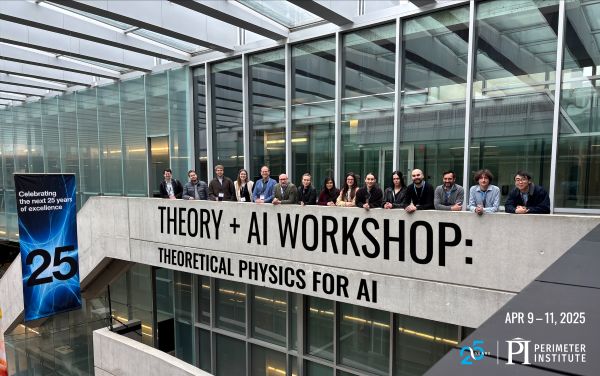
-
Theory + AI Symposium
21 talks-Collection NumberC25020 As Perimeter enters its 25th year, we invite you to imagine what theoretical physics research will look like 25 years from now. On April 7 and 8, Perimeter will be hosting a symposium with speakers and panel discussions focusing on the promise of AI to accelerate progress in theoretical physics. These talks will address the possibilities and challenges associated with AI ‘doing science.’ The event will bring together physicists, engineers, AI researchers, and entrepreneurs to collect different perspectives on what the future of theoretical physics will look like, the engineering challenges we should expect along the way, what tools and collaborations will be needed to help get us there, and what exciting steps are already underway.
Confirmed Speakers:
As Perimeter enters its 25th year, we invite you to imagine what theoretical physics research will look like 25 years from now. On April 7 and 8, Perimeter will be hosting a symposium with speakers and panel discussions focusing on the promise of AI to accelerate progress in theoretical physics. These talks will address the possibilities and challenges associated with AI ‘doing science.’ The event will bring together physicists, engineers, AI researchers, and entrepreneurs to collect different perspectives on what the future of theoretical physics will look like, the engineering challenges we should expect along the way, what tools and collaborations will be needed to help get us there, and what exciting steps are already underway.
Confirmed Speakers:
-
Frank Cappello (Argonne National Laboratory)
-
Yuri Chervonyi (Deep Mind)
-
Ioana Ciuca (Stanford University)
-
Deyan Ginev (LaTeXML)
- Geoffrey Hinton (University of Toronto)
- Shirley Ho (Polymathic & Simons Foundation)
-
Vicky Kalogera (Northwestern University)
-
Jared Kaplan* (Anthropic)
-
Peter Koepke (University of Bonn)
-
Roger Melko (University of Waterloo)
-
Moritz Munchmeyer (University of Wisconsin–Madison)
-
Axton Pitt (Litmaps)
-
Xiaoliang Qi (Stanford University)
-
Oleg Ruchayskiy (Niels Bohr Institute)
-
Gaurav Sahu (MILA)
-
Steinn Sigurdsson (arXiv)
-
Jesse Thaler (Massachusetts Institute of Technology)
-
Stephen Wolfram* (Wolfram Research)
-
Richard Zanibbi (Rochester Institute of Technology)
*virtual presentation
Scientific Organizers:-
Matthew Johnson (Perimeter Institute)
-
Anindita Maiti (Perimeter Institute)
-
Sabrina Pasterski (Perimeter Institute)
Advisory Committee:- Mykola Semenyakin (Perimeter Institute)
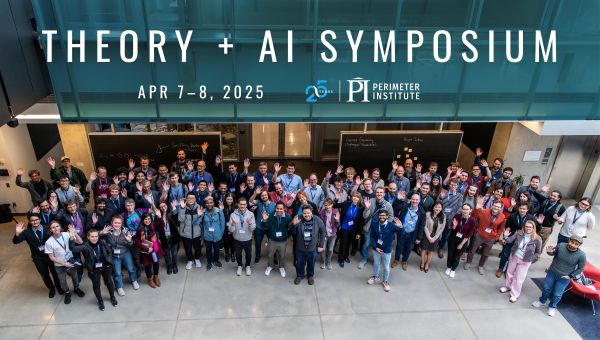
-
-
Quantum Information (Elective), PHYS 635, February 24 - March 28, 2025
13 talks-Collection NumberC25006We look to understand the possibilities and limits of quantum information processing, and how an information theory perspective can inform theoretical physics. Topics covered include: entanglement, tools for measuring nearness of quantum states, characterizing the most general possible quantum operations, entropy and measuring information, the stabilizer formalism, quantum error-correcting codes, the theory of computation, quantum algorithms, classical and quantum complexity. Instructor: Alex May/Bindiya Arora Students who are not part of the PSI MSc program should review enrollment and course format information here: https://perimeterinstitute.ca/graduate-courses

